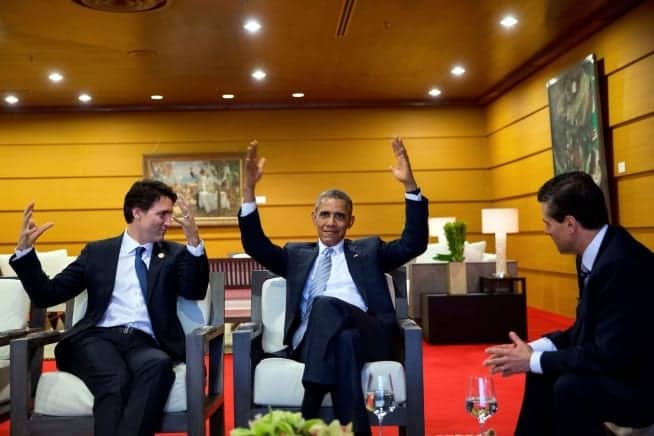Trudeau’s 2016

As the ball dropped for a yet another year in Times Square, along with another atrocious New Years Eve special by Kathy Griffin and Anderson Cooper, we welcomed in 2016. Looking back, 2015 was an incredibly eventful year for Canada. Several pivotal issues came to the forefront across Canadian discussions everywhere and we saw a somewhat shocking majority formed by the Liberal government under golden-boy Trudeau. Subsequently ousted was Stephen Harper, who seemed to become more and more out of touch with the Canadian people.
With this change in leadership, 2016 promises a completely different political and societal landscape for this country. Under the Liberals’ promises, several fundamental tenants of our democracy will be reviewed and reformed.
For one, this year may bring legal marijuana. Trudeau has promised that he would make marijuana legal during his campaign. He has repeatedly said that the current Canadian marijuana policy does not work, citing that young people have easy access to marijuana under the current model. If Trudeau produces nation-wide marijuana legalisation, Canada would be the first country under the G7 and G20 to achieve comprehensive legalisation of marijuana. This would be an absolute seismic change to Canadian lives, political landscapes around the world and the perception of marijuana on a global scale. Questions such as what would happen to those incarcerated with charges regarding marijuana and what will be the subsequent steps by countries like the United States who is pondering legalisation naturally arise. Not to mention, Canadian recreational users who currently gain access to marijuana through the black market will see shifts in how they consume their weed.
Secondly, and perhaps more importantly, is the steps that Trudeau claims he will take on Aboriginal affairs. Trudeau plans to implement all ninety-four recommendations called for by Truth and Reconciliation Commission and has launched a national inquiry into missing and murdered Indigenous women and girls. The general sentiment from Indigenous communities during the time of the election was that they felt the Harper government fell out of touch with the Indigenous peoples of Canada and that their voices were not being heard. As a result, Aboriginal electoral turnout was significantly higher in the last election and helped Trudeau gain office. It will be interesting to see if Aboriginal relations will be improved under the new government and if Trudeau will follow up on his promises.
In addition to these issues, several important issues will surround Trudeau’s first year in office. He has an ambitious agenda, which includes a tax cut to the middle class, which in turn, forces a new tax bracket for the rich. Already, critics have suggested that this tax reform may not transpire under the Liberals’ model and some have even suggested that the GST will increase to compensate for the tax reform. Trudeau also has spoken a lot of rhetoric about how Canada ‘is back’ on global environmental leadership, and has promised a focus on the environment during his election. Amidst a struggling Canadian dollar and slumping oil that does not seem to be gaining momentum any time soon, it is intriguing to see how Trudeau will balance his economic and environmental agenda.
Finally, Trudeau’s most scrutinized agenda, national policy, in response to the recent terrorist attacks around various parts around the globe, will be something that every Canadian should monitor and follow, as it may produce a shift from the militaristic approach taken by Harper in the last decade to a focus on humanitarian aid.
Trudeau may make Canada a very different place in 2016 than it was before. The question is if it will be for better or worse. We’ve been entrenched within the Harper agenda for the last decade – and the victory that Trudeau won was significant, shocking and refreshing. Let’s see if 2016 will produce the same results.

![[1B] Pete Souza](http://www.carillonregina.com/wp-content/uploads/2016/01/1B-Pete-Souza.jpg)







